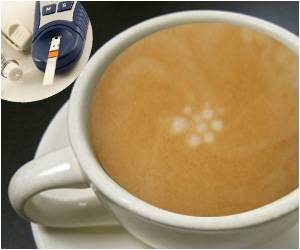Drinking coffee may prevent hip fractures in middle-aged and older women
- Over 76,000 hip fractures occur in the United Kingdom each year, with women being disproportionately affected
- Drinking coffee in appropriate amounts can lower your risk of hip fracture //
- It was discovered that eating 25g more protein per day reduced the incidence of hip fractures by 45%, but drinking an additional cup of coffee is the icing on the cake
According to CEBR, the UK consumes over 95 million cups of coffee each day, and the health advantages of the country’s favorite caffeinated beverage are widely documented. Aside from the benefits to energy, life expectancy, and gut health, scientists have discovered that drinking coffee and tea regularly reduces the chance of hip fractures in women.
Every year, over 76,000 hip fractures occur in the United Kingdom, with women being disproportionately impacted. We are three times more likely than men to suffer a hip fracture, owing to our inherently lower bone density.
“Hip fractures occur more frequently in women because of the increased bone density loss that occurs in women during menopause," explains Dr. Zoe Watson, an NHS GP and founder of well-good wellbeing. When estrogen levels fall after menopause, bone resorption increases, eventually leading to osteoporosis. Women have nearly three times the rate of osteoporosis as men. Because osteoporotic bones are far weaker and more liable to break after a fall, women have a higher likelihood of hip fracture than males.
“It also requires major surgery to fix. Depending on where in the hip the fracture has occurred, the surgery is either a dynamic hip screw to fix the fracture or a hip replacement operation to replace the head of the femur. Patients who break hips are often elderly and have multiple pre-existing conditions such as heart or lung disease—all of which increase risks during and after surgery”.
Why are Hip Fractures More Common in Women?
Hip fractures are the most common serious injury in older adults, costing the NHS an estimated £2-3 billion per year, and thus harm us all. “Hip fractures are significant for a variety of reasons,” explains Dr. Watson. The initial break might cause significant internal blood loss, necessitating a blood transfusion. We’ve all become aware of the burden on the NHS and the impact this has on each of us in recent years, so it’s not difficult to understand the impact that these kinds of injuries can have on the population as a whole.How Does Coffee Minimize our Risk?
While hip fractures, osteoporosis, and arthritis are commonly associated with the elderly, the actions we take in our daily lives now can have an impact on our future risk. A study undertaken by food scientists at the University of Leeds, in particular, found that every additional cup of tea or coffee consumed by women is connected with a 4% reduction in hip fracture risk. That may not seem like much, but every percentage counts.James Webster, a Ph.D. researcher at the school of food science and nutrition at the University of Leeds, led the study, which was based on a large observational analysis of over 26,000 women. “Diet is a factor that people may adjust to protect themselves by maintaining healthy bones and muscles,” adds Webster.
“This study is one of the first to investigate relationships between food and nutrient intakes and risk of hip fracture, with hip fractures accurately identified through hospital records,” he continues.
“The results highlight which aspects of diet may be useful tools in reducing hip fracture risk in women, with evidence of links between higher protein, tea, and coffee intakes and a reduced risk”.
The Controversy Surrounding Caffeine and Bone Density
Despite the absence of scientific proof, coffee has long been linked to poor bone health. While some people should avoid coffee and/or caffeine owing to medical issues or pregnancy, it is not necessary to avoid coffee for the sake of your bones.Contrasting Studies Demonstrating the Pharmacological Link of Caffeine and Bones
Caffeine’s most well-known pharmacological effect is the non-specific inhibition of adenosine receptors. In vitro studies demonstrate that direct activation of adenosine A2A and A2B receptors stimulates bone formation by activating osteoblasts and inhibiting osteoclast development and function. Caffeine’s competitive inhibition of adenosine A2 receptors may thereby impede bone growth while promoting bone resorption. Antagonism of adenosine A1 receptors, on the other hand, may have contrary effects. Caffeine has also been linked to bone damage via disruption of calcium metabolism, altered vitamin D responses, and other mechanisms (1✔ ✔Trusted Source
The effects of caffeine on bone mineral density and fracture risk
Go to source).
To Significantly Reduce our Risk, eat More Protein
The study does not identify a ceiling- that is, the maximum amount of coffee beyond which the bone advantages cease - but it is worth noting that researchers were originally investigating the benefits of ingesting more protein for bone health. Eating 25 g of additional protein per day (the equivalent of a plate of whole grain toast with baked beans and an egg) was found to reduce the incidence of hip fractures by 45%. So, if you want to make a noticeable change, it’s time to raise your protein intake. However, having an additional cup of coffee may be the icing on the cake.This is not the first study to show a link between coffee and bone health. A 2020 study discovered that consuming coffee can enhance bone mass, with experts speculating that this is due to the unique metabolites in coffee that are beneficial to bone health.
Additional Ways to Improve Bone Health
While we are all for increasing our coffee consumption, there are other vital strategies to maintain and improve bone health, such as exercise and dietary adjustments.A Well-balanced Diet
A healthy, balanced diet is essential for the development and maintenance of a healthy skeletal structure. Include lots of calcium from milk, cheese, soy, almonds, and green leafy vegetables, as well as plenty of vitamin D. The NHS recommends taking a vitamin D pill from September to March.
If you’re a vegan or vegetarian, make sure you’re getting plenty of lentils, seeds, tofu, and fortified nondairy milk to meet your nutritional needs.
Exercising With Weights
Exercise, along with a healthy diet, is essential for bone health.
Strength training is beneficial to our bones, particularly after the age of 35, when bone density begins to decline. Running, tennis, any other load-bearing exercise, or even walking is great for the skeleton - just get moving.
In clinical and population-based studies, the impact of caffeine consumption on bone metabolism offers a mixed picture, which may be due to the amount of coffee consumed, with some but not all studies suggesting a potential link between caffeine intake and a lower risk of hip fracture.
Reference:
- The effects of caffeine on bone mineral density and fracture risk - (https://pubmed.ncbi.nlm.nih.gov/34981132/)
Source-Medindia
















